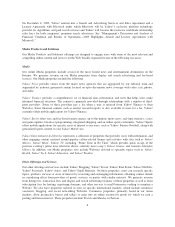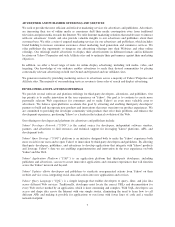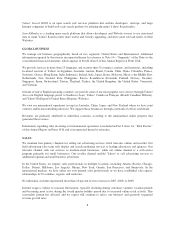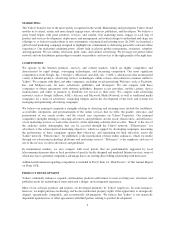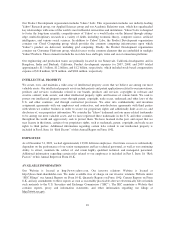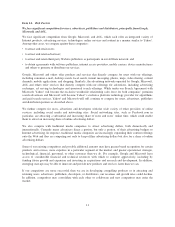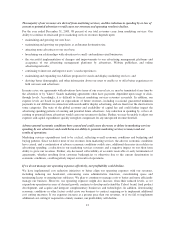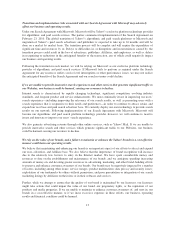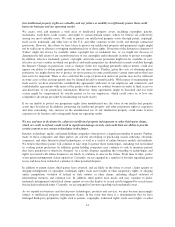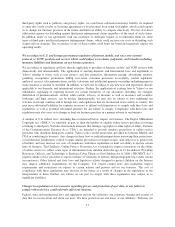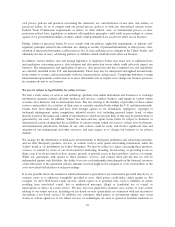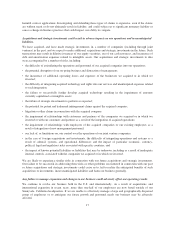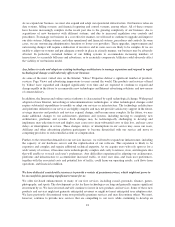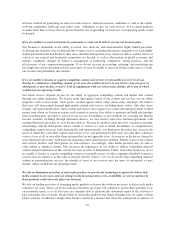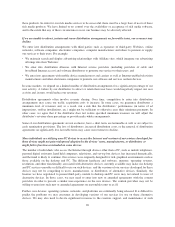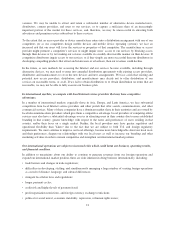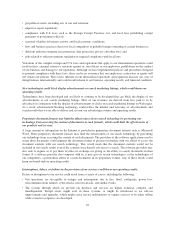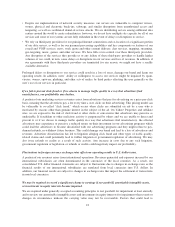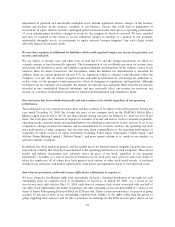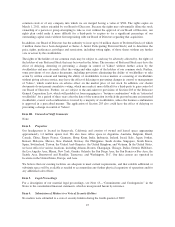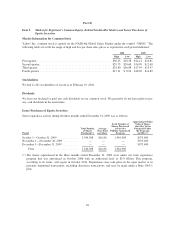Yahoo 2009 Annual Report Download - page 24
Download and view the complete annual report
Please find page 24 of the 2009 Yahoo annual report below. You can navigate through the pages in the report by either clicking on the pages listed below, or by using the keyword search tool below to find specific information within the annual report.own privacy policies and practices concerning the collection, use, and disclosure of user data. Any failure, or
perceived failure, by us to comply with our posted privacy policies or with any data-related consent orders,
Federal Trade Commission requirements or orders, or other federal, state, or international privacy or data-
protection-related laws, regulations or industry self-regulatory principles could result in proceedings or actions
against us by governmental entities or others, which could potentially have an adverse effect on our business.
Further, failure or perceived failure by us to comply with our policies, applicable requirements, or industry self-
regulatory principles related to the collection, use, sharing or security of personal information, or other privacy, data-
retention or data-protection matters could result in a loss of user confidence in us, damage to the Yahoo! brands, and
ultimately in a loss of users, advertising partners, or Affiliates which could adversely affect our business.
In addition, various federal, state and foreign legislative or regulatory bodies may enact new or additional laws
and regulations concerning privacy, data-retention and data-protection issues which could adversely impact our
business. The interpretation and application of privacy, data protection and data retention laws and regulations
are currently unsettled in the U.S. and internationally. These laws may be interpreted and applied inconsistently
from country to country and inconsistently with our current policies and practices. Complying with these varying
international requirements could cause us to incur substantial costs or require us to change our business practices
in a manner adverse to our business.
We may be subject to legal liability for online services.
We host a wide variety of services and technology products that enable individuals and businesses to exchange
information, generate content, advertise products and services, conduct business, and engage in various online
activities on a domestic and an international basis. The law relating to the liability of providers of these online
services and products for activities of their users is currently unsettled both within the U.S. and internationally.
Claims have been threatened and have been brought against us for defamation, negligence, copyright or
trademark infringement, unfair competition, unlawful activity, tort, including personal injury, fraud, or other
theories based on the nature and content of information to which we provide links or that may be posted online or
generated by our users. In addition, Yahoo! has been and may again in the future be subject to domestic or
international actions alleging that the availability of certain content within our services violates laws in domestic
and international jurisdictions. Defense of any such actions could be costly and involve significant time and
attention of our management and other resources and may require us to change our business in an adverse
manner.
We arrange for the distribution of third-party advertisements to third-party publishers and advertising networks,
and we offer third-party products, services, or content, such as stock quotes and trading information, under the
Yahoo! brand or via distribution on Yahoo! Properties. We may be subject to claims concerning these products,
services, or content by virtue of our involvement in marketing, branding, broadcasting, or providing access to
them, even if we do not ourselves host, operate, provide, or provide access to these products, services, or content.
While our agreements with respect to these products, services, and content often provide that we will be
indemnified against such liabilities, the ability to receive such indemnification depends on the financial resources
of the other party to the agreement and any amounts received might not be adequate to cover our liabilities or the
costs associated with defense of such proceedings.
It is also possible that if the manner in which information is provided or any information provided directly by us
contains errors or is otherwise wrongfully provided to users, third parties could make claims against us. For
example, we offer Web-based e-mail services, which expose us to potential risks, such as liabilities or claims
resulting from unsolicited e-mail, lost or misdirected messages, illegal or fraudulent use of e-mail, or
interruptions or delays in e-mail service. We may also face purported consumer class actions or state actions
relating to our online services, including our fee-based services (particularly in connection with any decision to
discontinue a fee-based service). In addition, our customers, third parties or government entities may assert
claims or actions against us if our online services or technologies are used to spread or facilitate malicious or
16


